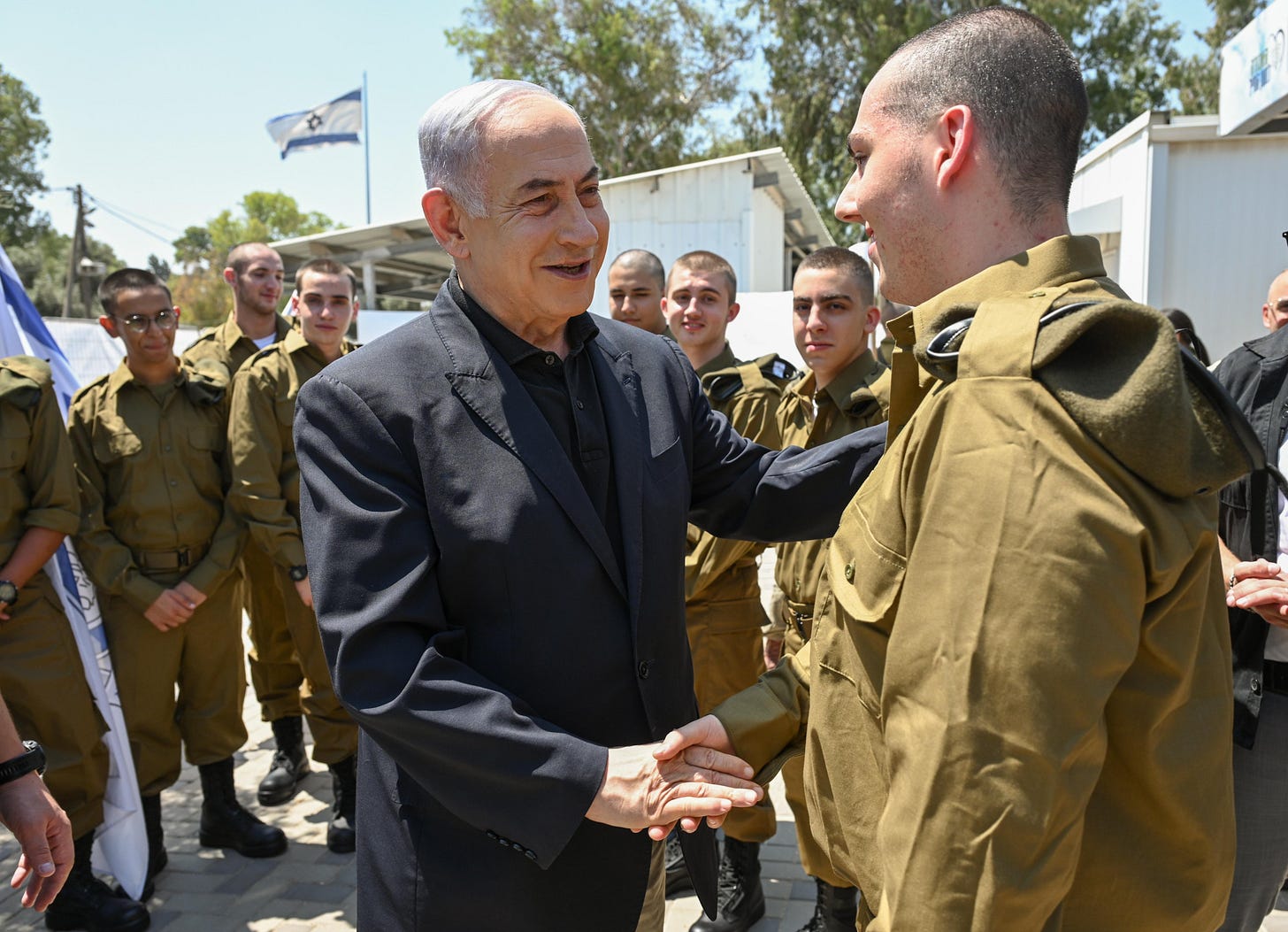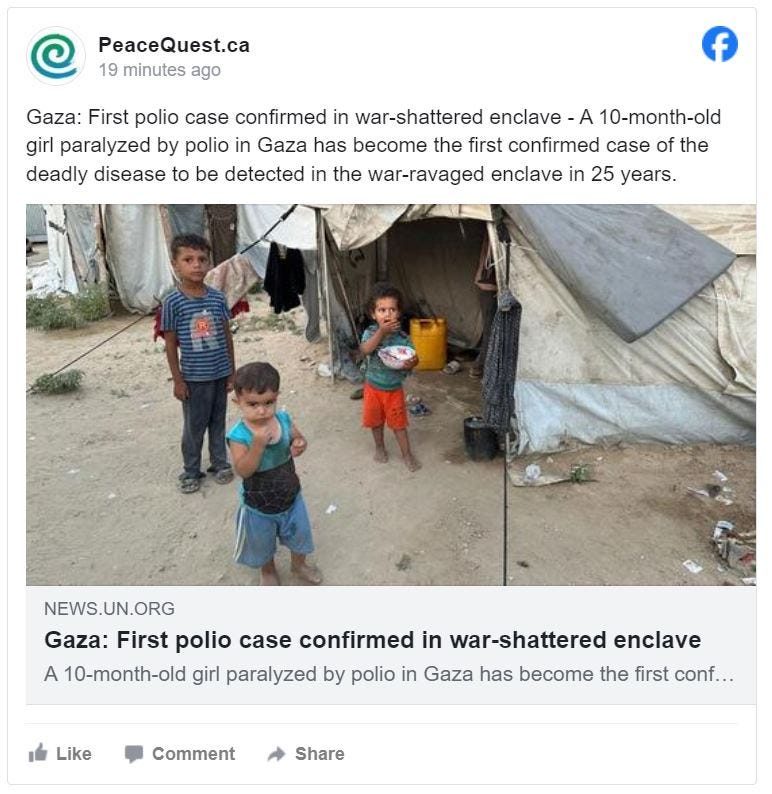Israel and Hamas leaders benefiting from Gaza war
Crisis boosts the political fortunes of both sides
A potential regional war looming, over two hundred citizens taken hostage and 1200 killed during a preventable massacre, and international condemnation over potential war crimes, yet Israeli Prime Minister Benjamin Netanyahu’s political support has increased recently, according to a new public opinion poll.
Israel’s news publication Haaretz reports that for the first time since the start of the war in Gaza, the weekly Maariv poll found Netanyahu's Likud party would win in a party vote if elections were held that day.
For the first time since the start of the war [Netanyahu’s] party would win if an election were held today in Israel
“For the first six months after October 7 [the date of Hamas’ deadly surprise attack on Israel], polls for Netanyahu and his government were a disaster,” writes Haaretz reporter Dahlia Scheindlin. But now, Netanyahu's Likud party would beat out its rivals in a national election.
For Netanyahu, Iran is a winning issue
What could have happened to generate watershed progress in his post-war poll recovery?
All evidence points to Iran, she says. The direct attack on Israel by Iran in retribution for the brazen Israeli assassination of an Iranian official in Syria on April 1 galvanized support for Israel’s ruling party.
“When Iran was poised to respond, Israel rallied an international coalition of Western and Arab allies that would have been unthinkable barely a decade earlier, and together they repelled Iran’s attack in an impressive military and diplomatic feat,” writes Scheindlin. “When it was over, by late April, Netanyahu saw his best polls since the start of the war to date.”
Support similarly rises for Hamas amid Gaza’s destruction
On the other side, tens of thousands of men, women and children, combatants and civilians alike, have been killed by Israel’s bombings, millions face hunger, much of Gaza in ruins, and support among Palestinians for Hamas, the militant group that has governed Gaza for nearly two decades, has only grown.

A June poll of Palestinians in Gaza and the West Bank found that when asked which political party or movement they prefer, the largest percentage (40%) said they prefer Hamas. These results mean that support for Hamas over the past three months has increased by 6 percentage points according to the Palestinian Center for Policy and Survey Research.
Two-thirds of the Palestinian public continue to support the October 7 attack
You might think Palestinians would be unhappy with Hamas after the group’s military wing sparked the current crisis with the October 7 attack on Israeli border communities and a music festival. A shocking 80% of Gazans say they have lost a relative or that a relative has been injured in the current war.
On the contrary; two-thirds of the Palestinian public continue to support the October 7 attack. To break the current deadlock in the political process to end the Israeli occupation, current findings point to an 8 percentage point rise in support for armed struggle to nearly one-third, the poll found.
Echoes of 9/11 and George W. Bush
The Middle East is not much different than elsewhere, sadly. War and conflict buoy political leaders when the public rallies around them in times of crisis.

Think back to the days when the Bush Administration was languishing before the September 11, 2001 terrorist attacks on the World Trade Center and the Pentagon.
“The attacks transformed American public opinion and fundamentally reshaped Bush’s image. His job approval rating reached 86% by late September. The public expressed broad willingness to use military force to combat terrorism,” writes the U.S.’s Pew Centre.
Canadians never supported the post-9/11 wars in Iraq and Afghanistan to that high degree. Still, it’s debatable whether public opinion would be affected any differently had our country come under a direct attack. Let's hope we are never put to the test.
If you found this article interesting or informative, please Like, Share or comment.
Last week’s poll results
I asked readers to react to the statement: Military spending is growing because the world is becoming a more dangerous place. Opinion was nearly evenly divided, with 42% agreeing and 46% disagreeing.
Stay up-to-date about global hot spots on Facebook
You can follow critically important global updates from the United Nations news service on PeaceQuest’s Facebook page. I post UN News articles almost daily on Facebook. Follow PeaceQuest on Facebook.
Did you miss last week’s newsletter?
Thank you for everything you do for peace,
Steve







It is sad and worrisome that public opinion in whatever country continues to lean towards a support for militarism and violence when faced with conflict and crisis. There is an illusion of strength to overcome the "enemy". My great hope is that humanity will move towards a desire for peace despite conflict, and learn to live out of a commitment to nonviolent resistance and early nonviolent means to resolve the conflict. The question is: how can the peace movement educate the public on nonviolence as a way of living in good times and in conflict? How can humanity come to appreciate its intelligence, creativity, and deepest values which would lead to far more effective alternatives to war, revenge, retaliation and every form of violence.
I chose one of the results of Canada not signing up for war but it didn't accept my reply.
I chose " I agree "